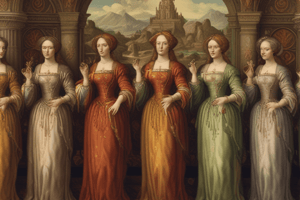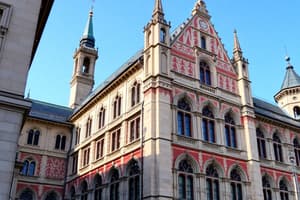Podcast
Questions and Answers
What invention helped perpetuate humanist ideas and allowed criticism of the church to circulate more widely?
What invention helped perpetuate humanist ideas and allowed criticism of the church to circulate more widely?
- The spinning wheel
- The compass
- Gunpowder
- The printing press (correct)
What did Erasmus write about?
What did Erasmus write about?
- The history of Rome
- The nature of the universe
- The art of painting
- The freedom of the will (correct)
Where did the Renaissance and humanism start?
Where did the Renaissance and humanism start?
- Germany
- France
- Italy (correct)
- England
What did the church do in response to the Renaissance and humanism?
What did the church do in response to the Renaissance and humanism?
What did the invention of the printing press lead to?
What did the invention of the printing press lead to?
What was the Renaissance period characterized by?
What was the Renaissance period characterized by?
Where did the Renaissance movement, known as humanism, start?
Where did the Renaissance movement, known as humanism, start?
What did the Renaissance emphasize in contrast to the Dark Ages?
What did the Renaissance emphasize in contrast to the Dark Ages?
What did the Renaissance era celebrate in art, particularly with artists like Leonardo da Vinci?
What did the Renaissance era celebrate in art, particularly with artists like Leonardo da Vinci?
What was the main focus of the Renaissance movement known as humanism?
What was the main focus of the Renaissance movement known as humanism?
Where did the Renaissance movement begin?
Where did the Renaissance movement begin?
What was the Renaissance era's shift in focus from the Dark Ages?
What was the Renaissance era's shift in focus from the Dark Ages?
Who was a leading humanist involved in the collection and publication of ancient Greek manuscripts of the New Testament?
Who was a leading humanist involved in the collection and publication of ancient Greek manuscripts of the New Testament?
What did the Renaissance era celebrate in art, with artists like Leonardo da Vinci conducting research on it?
What did the Renaissance era celebrate in art, with artists like Leonardo da Vinci conducting research on it?
Flashcards are hidden until you start studying
Study Notes
The Renaissance: A Rebirth of Humanism and Art
- The Renaissance was a period of revival in Europe during the end of the Middle Ages, characterized by a renewed interest in humanism, art, and literature.
- The term "Renaissance" means rebirth, reflecting the optimism and renewal following the end of the Black Plague and a shift towards human-centered focus in academic and artistic matters.
- In contrast to the Dark Ages, the Renaissance emphasized human observation, science, and free inquiry, leading to a celebration of the human mind and body in art and literature.
- The Renaissance movement, known as humanism, emphasized the human mind and body, portraying them in a celebratory and realistic manner, in contrast to the somber and suffering depictions of the Dark Ages.
- The Renaissance began in Florence, Italy, during the peak of the Medici family's power, who patronized the arts and commissioned beautiful paintings and sculptures.
- Despite initial resistance from conservative townspeople and the church, Renaissance art eventually found its way into churches and cathedrals across Europe.
- The Renaissance also sparked a renewed interest in ancient Greek and Latin literature, leading to improved studies of the New Testament and a standardization of the Greek text for translators.
- Erasmus of Rotterdam, a leading humanist, collected ancient Greek manuscripts of the New Testament and published a Greek text that became a standard for translators.
- The Renaissance brought about a revival in classical Latin literature, with literary experts engaging in literary criticism to compare and contrast various sources of the same writing.
- The Renaissance marked a shift from the control of art and education by the Roman Catholic Church in the Dark Ages to a focus on humanism, science, and free inquiry.
- The Renaissance era celebrated the nuances of the human body, with artists like Leonardo da Vinci conducting research on human anatomy to represent it realistically in art.
- The Renaissance movement, known as humanism, emphasized the human mind and body, portraying them in a celebratory and realistic manner, in contrast to the somber and suffering depictions of the Dark Ages.
Studying That Suits You
Use AI to generate personalized quizzes and flashcards to suit your learning preferences.




